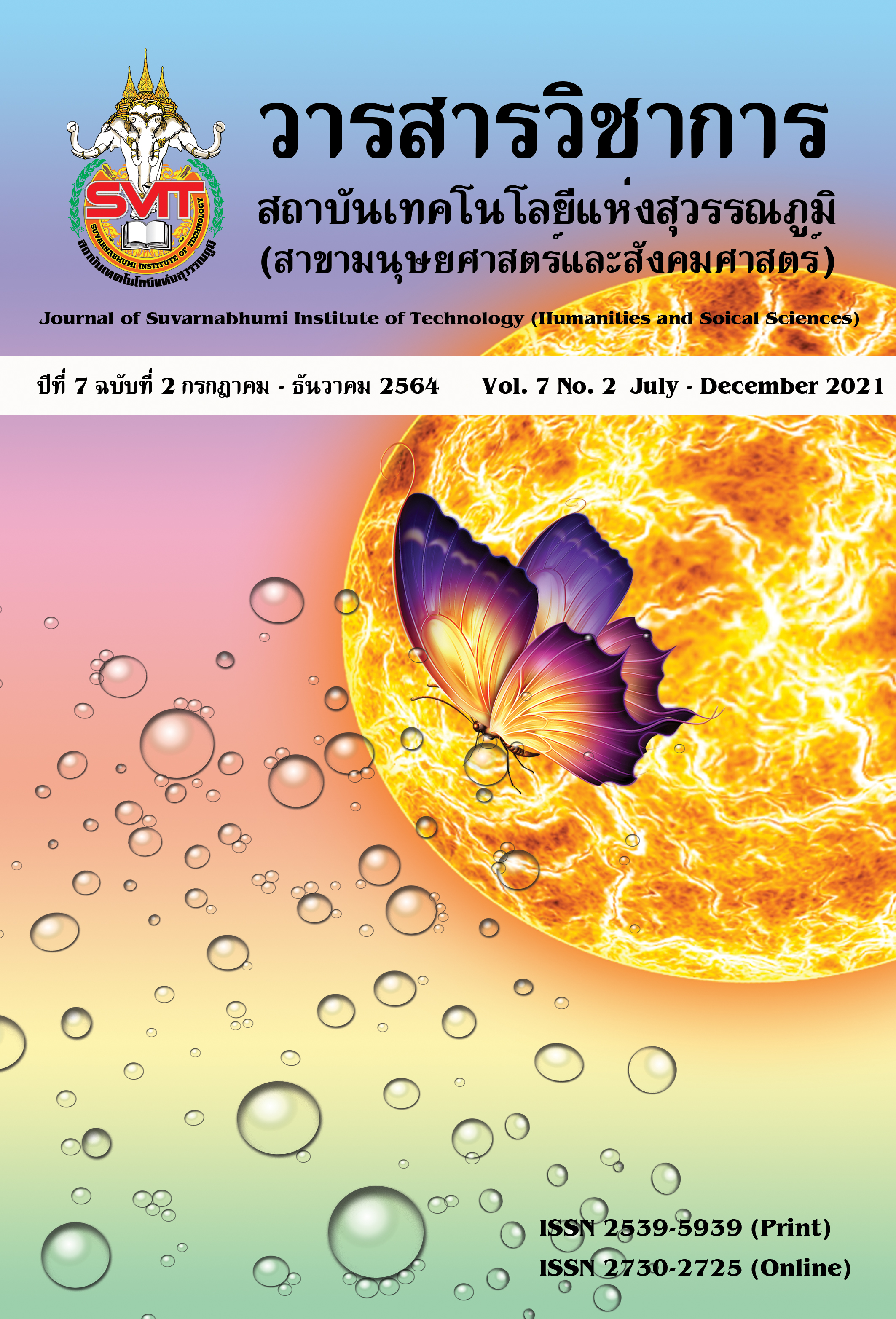MEDIATING VARIABLES EFFECTS ON INFORMATION LEADERSHIP CHARACTERISTICS TOWARDS THE ADMINISTRATIVE EFFICIENCY OF ADMINISTRATORS IN SECONDARY SCHOOLS UNDER THE PRIMARY EDUCATIONAL SERVICE AREA IN THE WESTERN REGION
Keywords:
Information leadership, Mediating variables effects, AdministratorAbstract
The purpose of this research was to study the information leaders’ characteristics, the relationships and effects on the information leaders’ characteristics, develop and check the validity of the casual model of factors influencing the administrative in secondary schools and compare the direct and indirect of information leaders’ characteristics effecting on the administrative in secondary schools under the primary educational service area in the western region.The sampling group is selected by multi-stage which have 252 people who are the administrators in secondary schools and the information leaders. Tools used in this research is a questionnaire for administrators schools, the reliability values were between 0.883 and 0.968. The statistics used in the data analysis were descriptive statistics and the analytical statistics to answer research questions were multiple regression, use the imported cascade step method and analysis to verify the validity of the research hypothesis model by using a packaged program.
The findings:
1. Most of the six characteristics variance of information leaders was in high average. The productivity variance and professional skill variances gave the highest mean while the leadership and vision variances gave the lowest mean. The findings in three role conflicts variances showed that the most of these variances yield the medium to high average where the job control variances had the highest average and job support had the lowest average. For the five role conflict management variances, most of the variance had medium to high averages where collaborating had a highest yield and competing variance fill in the minimal range. The finding in five administrative in schools variances, most of the variance had medium to high average where co-worker satisfaction had a lower yield and work satisfaction variance had a highest yield.
2. The role conflict management variance and the administrative in secondary schools of information leaders had linear correlation, which meaned that administrators had high job satisfaction when they were able to manage and solve the role conflict
3. The validation results of the models was fit to the empirical data with the goodness of fit statistics as follows: chi-square=126.68; df=116; p=0.234; GFI=0.943; AGFI = 0.907 and RMR= 0.0216.
4. The analysis of the direct effect, indirect effect and total effect found that the information leader characteristics variances had direct effect at 0.84, indirect effect at 0.04 and total effect at 0.88 to the administrative in secondary schools, the information leader characteristics variance had total effect at 0.78 to the role conflict variance and at 0.69 to role conflict management. The role conflicts had a total effect at -0.67 to the administrative in secondary schools and role conflict management had total effect at 0.54 to the administrative in secondary schools, it meaned that administrators which had the abilities in role conflict management would have a direct effect to the administrative in secondary schools and make the job satisfaction higher.
References
กระทรวงดิจิทัลเพื่อเศรษฐกิจและสังคม. (2562). รู้จักกระทรวง. สืบค้น 23 ธันวาคม 2564, จาก http://www.mdes.go.th/view/1/เกี่ยวกับกระทรวง.
นิคม นาคอ้าย. (2549). องค์ประกอบคุณลักษณะผู้นำเชิงอิเล็กทรอนิกส์และปัจจัยที่มีอิทธิพลต่อประสิทธิผลภาวะผู้นำเชิงอิเล็กทรอนิกส์สำหรับผู้บริหารสถานศึกษาขั้นพื้นฐาน (ปริญญานิพนธ์ปริญญาดุษฏีบัณฑิต สาขาวิชาการบริหารการศึกษา). บัณฑิตวิทยาลัย มหาวิทยาลัยศรีนครินทรวิโรฒ.
เบญจวรรณ ถนอมชยธวัช, ผ่องศรี วาณิชย์ศุภวงศ์, วุฒิชัย เนียมเทศ, และณัฐวิทย์ พจนตันติ. (2559). ทักษะแห่งศตวรรษที่ 21: ความท้าทายในการพัฒนานักศึกษา. วารสารเครือข่ายวิทยาลัยพยาบาลและการสาธารณสุขภาคใต้, 3, 208-222.
สำนักงานรับรองมาตรฐานและประเมินคุณภาพการศึกษา (องค์กรมหาชน). (2547). พระราชบัญญัติการศึกษาแห่งชาติ พ.ศ. 2542 แก้ไขเพิ่มเติม (ฉบับที่ 2 ) พ.ศ. 2545. กรุงเทพมหานคร: พริกหวานกราฟฟิก.
Judge, T. A., Bono, J. E., & Locke, E.A. (2000). Personality and job satisfaction: The mediating role of job characteristics. Journal of Applied Psychology, 85, 237-249.
Lin, Ching – Hsiu., (2003). Perceived presidential leadership styles and faculty job satisfaction at Taiwanese institutes of technology (China). Dissertation Abstracts International. Retrieved December 23, 2021, from http://wwwlib.umi.com/ dissertations/fullcit/ 3067355.
Loi, R., & Ngo, H. (2001). The effect of professional identification on job attitudes: A study of lawyers in Hong Kong. Organizational Analysis, 12, 109–128.
Wong, J. Y., & Lin, J. H. (2007). The role of job control and job support in adjusting service employee’s work-to-leisure conflict. Tourism Management, 28, 726-735.
Yide, S. (2005). A meta – analysis of role ambiguity and role confliction IS professional job satisfaction. Proceedings of the 38th Hawaii International Conference on System Sciences. Big Island, HI: USA.
Downloads
Published
Issue
Section
License
The articles published are copyrighted by the Sarasas Journal of Humanities and Social Science. The opinions expressed in each article in this academic journal are those of the individual authors and do not reflect the views of Sarasas Suvarnabhumi Institute of Technology. The authors are solely responsible for all aspects of their respective articles. Any errors or inaccuracies in the articles are the sole responsibility of the authors.



